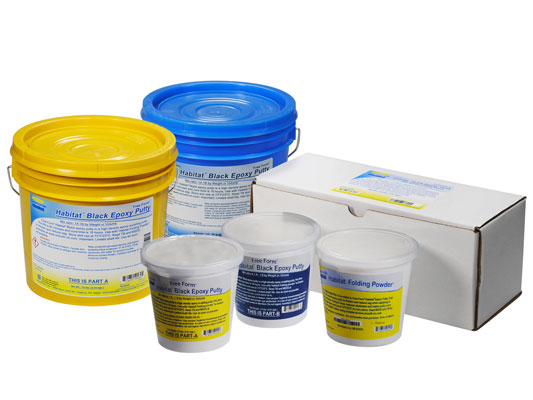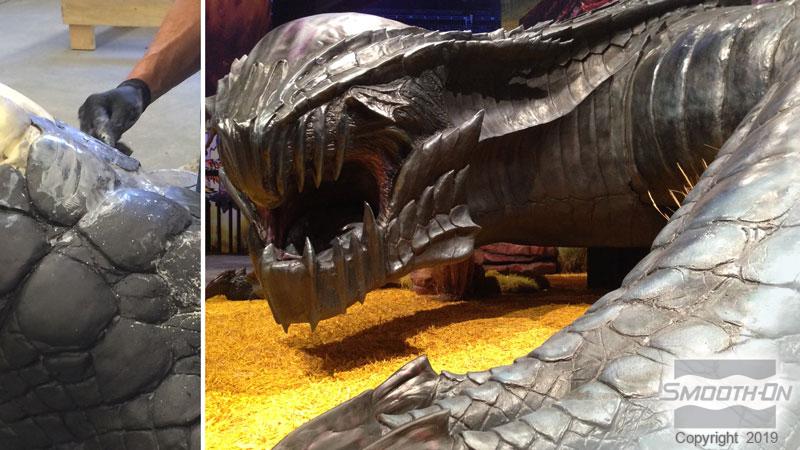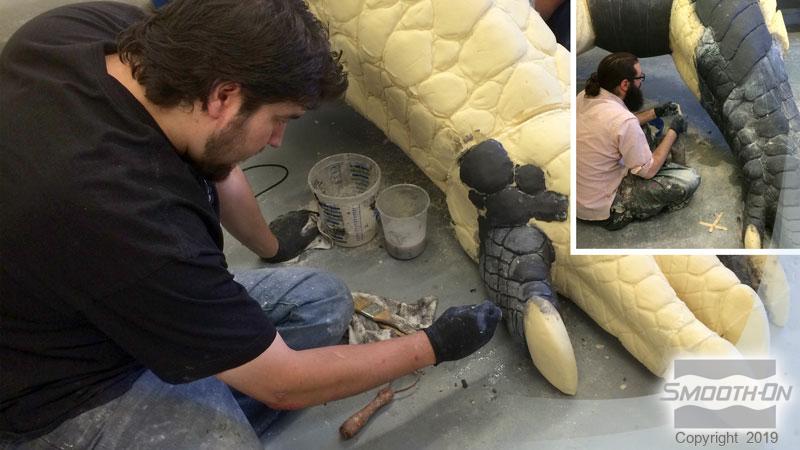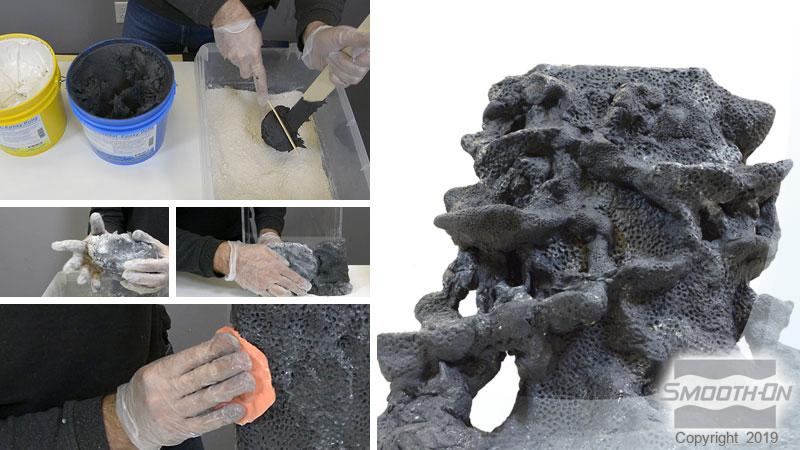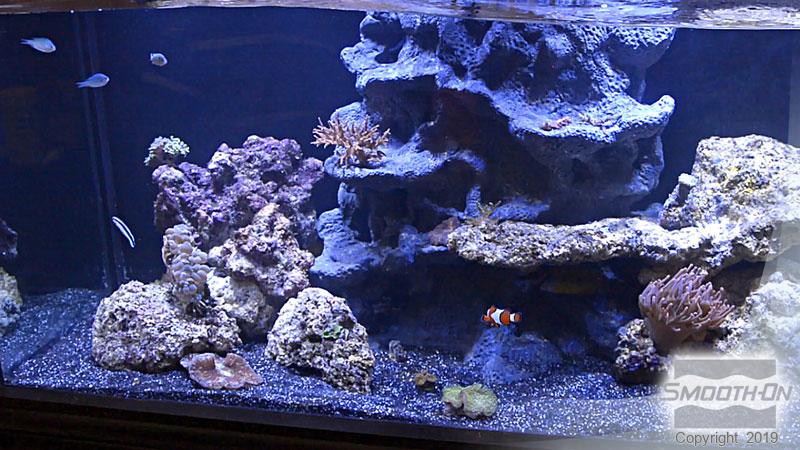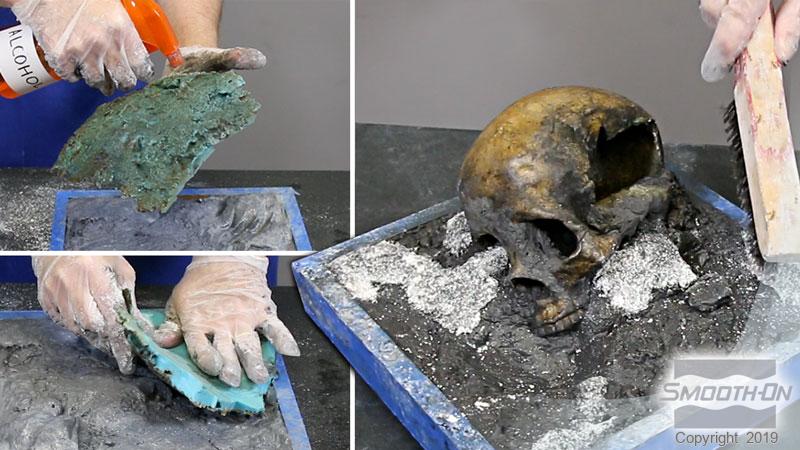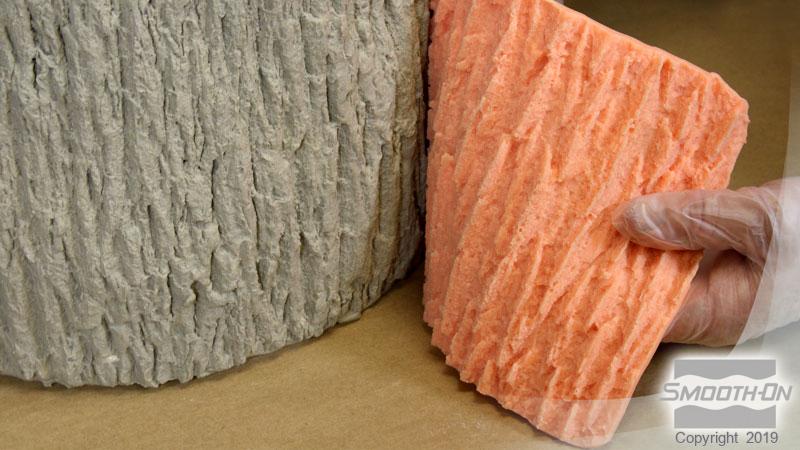Free Form™ Habitat™ Black
Free Form™ Habitat™ Black Epoxy Putty is a mix-by-hand putty that is used to create textured or highly detailed display pieces. Habitat™ Black is solvent-free and contains no VOC’s. Working time is 60 minutes and cure time is 16 hours at room temperature (73°F/23°C). Epoxy cures to a very hard, heat resistant material that is easily painted.
Use with Habitat™ Black Folding Powder – fold powder into epoxy putty to thicken and reduce sag when applied to a vertical surface. Folding Powder™ also reduces stickiness and makes the epoxy more handle-able.
Features
Habitat™ Black is suitable for interior and exterior use. It is certified ‘aquarium safe’ and used by aquariums to create hyper-realistic coral and other aquarium displays. Habitat™ Black is also used for general sculpting and theming applications.
Once putty is applied, it can be stamped with a silicone rubber stamp to create repeating patterns with intricate detail over a large surface area. Surface can be smoothed with alcohol or water. New Habitat™ Black will bond to cured Habitat™ Black without delamination. Habitat™ Black will not melt foam, and can be used as an EPS foam coating.
Free Form™ Habitat™ Black is also an excellent repair cement and bonds permanently to itself, PVC, Plexiglas™ (acrylic), wood, many metals, plastics and foams.
› Click here for more Free Form™ Habitat™ epoxy sculpting putty products.
Instructions
Safety – Use in a well-ventilated area (“room size” ventilation). Generally, if you use any epoxy system on a regular basis, wearing a NIOSH approved respirator is advised. Wear safety glasses, long sleeves and rubber gloves to minimize skin contact. Wear nitrile or vinyl gloves only.
Rate Of Coverage - Assuming a thickness of 0.25 in. (6.3 mm), 1 lb. (454 g) of Free Form™ Habitat™ Black will cover approximately 71.6 in2 (462 cm2).
Preparation – Materials should be stored and used at room temperature (73°F/23°C). This product has a limited shelf life and should be used as soon as possible. Mixing should be done in a well-ventilated area. Wear safety glasses, long sleeves and rubber gloves to minimize contamination risk. Before mixing materials, apply Folding Powder to work surface in a 1/4” (6.3 mm) layer. Powder gloves with Folding Powder to eliminate sticking.
Because no two applications are quite the same, a small test application to determine suitability for your project is recommended if performance of this material is in question.
Applying A Release Agent – For releasing epoxy from non-porous surfaces such as resin, metal, glass etc., use Ease Release 200 or 205 (available from Smooth-On) to prevent adhesion.
Measuring - Free Form™ Habitat™ Black comes as two parts. Dispense equal amounts of Part A and Part B. These products have a limited shelf life and should be used as soon as possible.
Mixing - This product is mixed by hand. You must wear gloves when mixing this material, wearing vinyl gloves reduces inhibition risk. First, thoroughly coat gloves with folding powder to prevent sticking. Knead parts A+B together while folding powder into mixture. The amount of powder to add depends on desired working consistency. The more powder you add, the thicker the mixture becomes. Fold mixture into itself repeatedly until desired consistency is attained (3-5 minutes or a minimum of 20 folds). For more on correct mixing technique, you can view our video: How to Mix Free Form™ Habitat™ and Folding Powder
Apply by gloved hand to horizontal, vertical or inverted surface. Important; pot life and cure time are reduced with elevated temperatures.
Stamp, Sculpt or Mold - Once in place, putty can be stamped using a rubber stamp (such as one made with Rebound 25™ brushable silicone). Apply alcohol to stamp detail before using for precise detail and to keep stamp clean. Sculpt using gloved hands or tools. Putty can also be pressed into a silicone rubber mold to reproduce detail.
Smoothing Surface – Epoxy surface can be smoothed with water or isopropyl alcohol. Option: cover putty surface with clear plastic food wrap and smooth or sculpt with hand or tool. Leave wrap in place until material cures and remove. Cured surface will have a high gloss finish.
Curing and Heat Resistance – Habitat™ Black will cure in 16 hours at room temperature. Elevated heat will cure epoxy faster. At an ambient temperature of 150°F/60°C, the material will cure in as little as 30 minutes. A heat gun may also be used, as long as the surface temperature of the Habitat™ Black does not exceed 212°F/100°C. Putty cured at room temperature with a minimum thickness of ½” (1.27 cm) will resist temperatures up to 165°F/74°C.
Post Curing - For higher heat resistance, cured Habitat™ Black can be heat post-cured in a dedicated industrial oven. Cure at 175°F/80°C for two hours, followed by three hours at 212°F/100°C. Thin sections may need to be supported during post curing. Allow material to cool to room temperature before use.
Machining – Cured castings are rigid and durable. They resist moisture, moderate heat, solvents, dilute acids and can be machined, primed/painted or bonded to other surfaces (any release agent must be removed). If machining cured Free Form™ Habitat™ Black plastics, wear dust mask or other apparatus to prevent inhalation of residual particles.
Painting – Cured Free Form™ Habitat™ Black can be primed and then painted with acrylic enamel paints. Let paint fully dry before putting part into service.
Removing Uncured Free Form™ Habitat™ Black - Remove as much uncured material from the surface as possible. Clean any residue with soap and water. Optional - Use E-POX-EE KLEENER™ available from Smooth-On.
Related Categories: Epoxy Putties
Related Series: Free Form™ Habitat™ Series – Mix-by-Hand Epoxy Sculpting Putties
How-To Articles
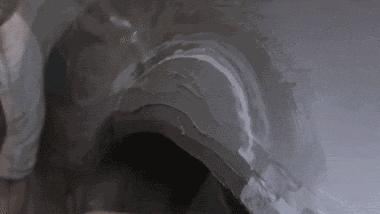
How To Repair a Fender Using Free Form™ Habitat™ Epoxy Putty
In this car repair tutorial video, Milo shows how you can repair a fender using Free Form™ Habitat™ epoxy putty.
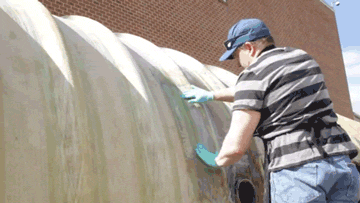
How to Repair Fiberglass Using Epoxy
Free Form® Habitat® epoxy putty and EpoxAmite® laminating epoxy are used to repair a fiberglass overflow tank.
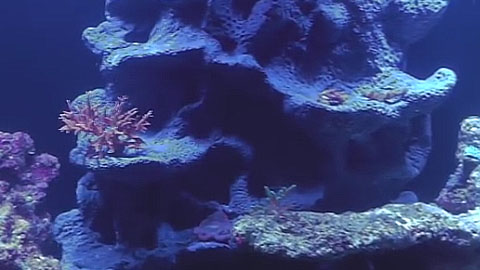
How To Make a Custom Overflow Cover Using Habitat™ Epoxy Putty
This video shows how to use Habitat™ Epoxy Putty to create a sculpted overflow cover for an aquarium.
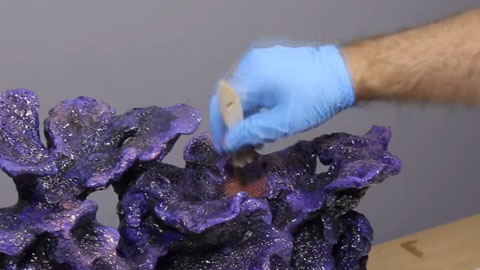
How To Paint Habitat™ Epoxy Using Smooth-Cast™ 327
This video shows the process of using Smooth Cast™ 327 urethane resin to paint an aquarium background.
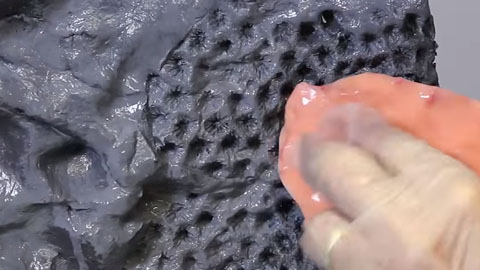
Aquarium Decoration Tutorial - How To Make a Silicone Coral Stamp
This video shows how to create a silicone stamp from a piece of coral that can then be used to create detail.
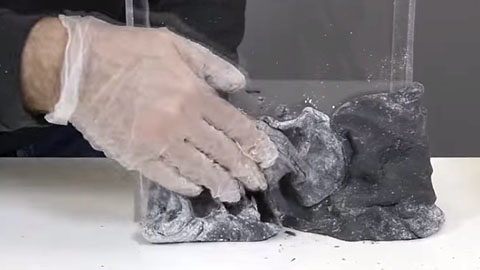
How to Mix Free Form™ Habitat™ and Folding Powder
This video how-to demonstration shows how to properly combine Folding Powder into Free Form™ Habitat™ Epoxy.

Building the World's Largest Underwater Christmas Tree
How Vegas Props fabricated the world's largest underwater Christmas tree
